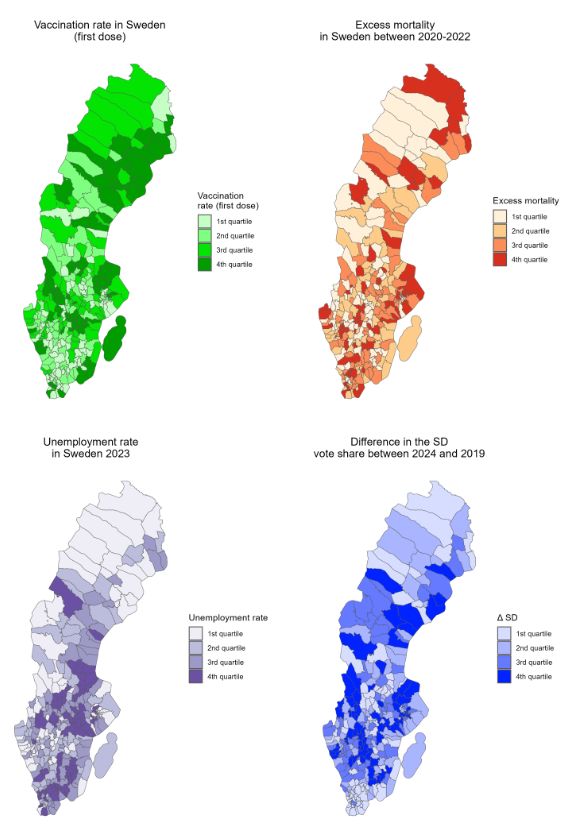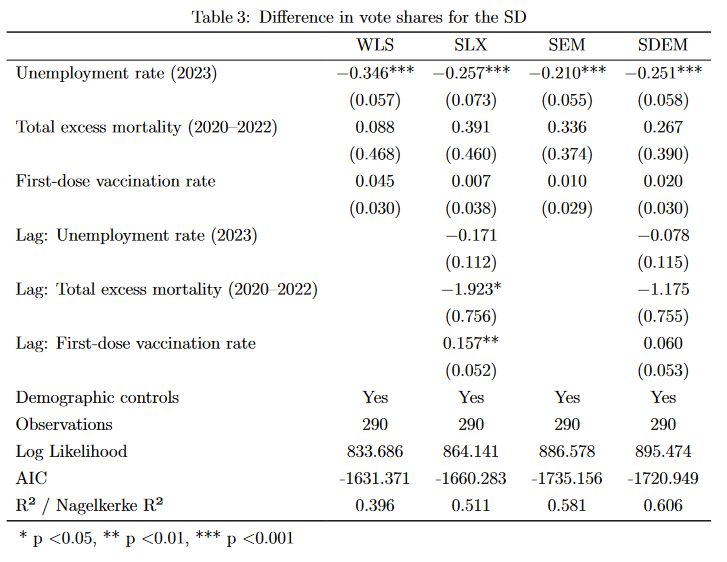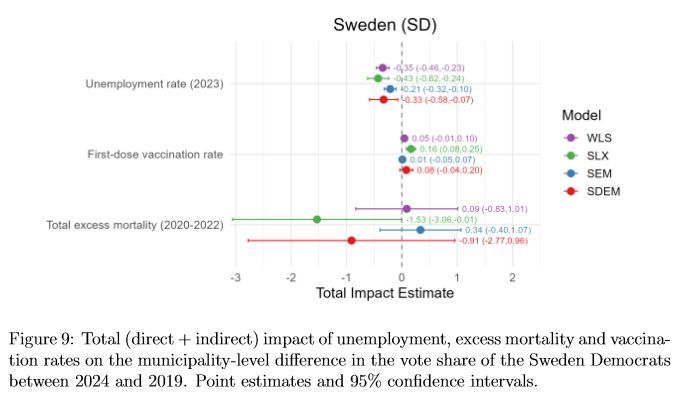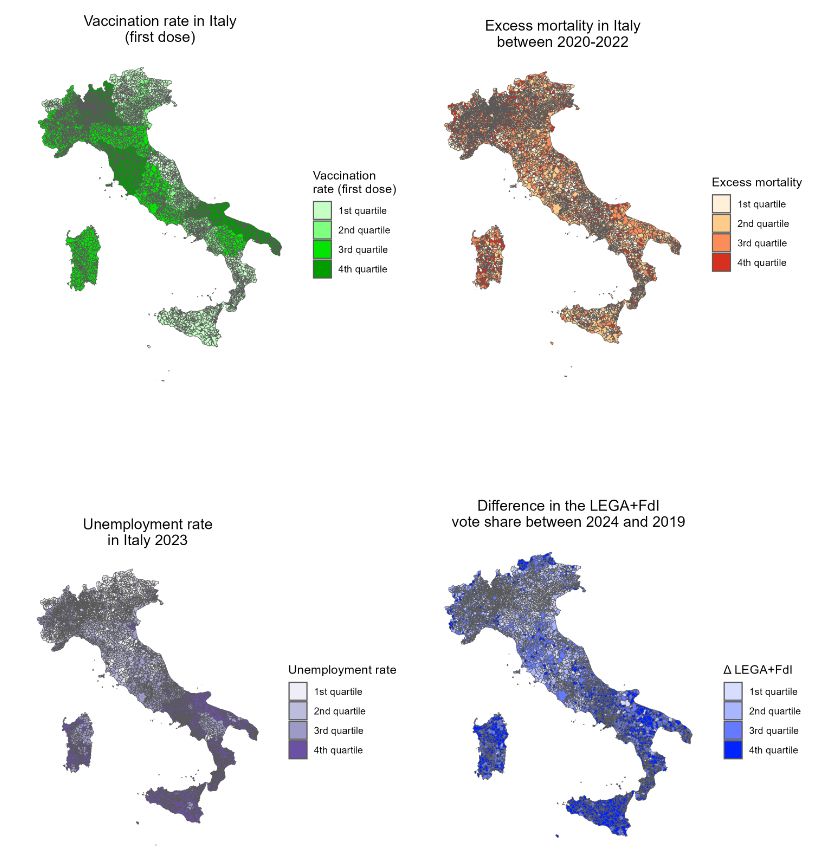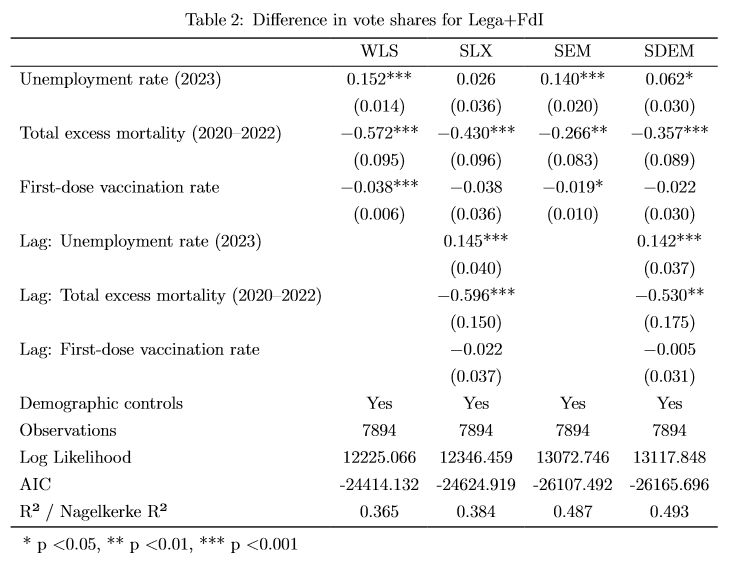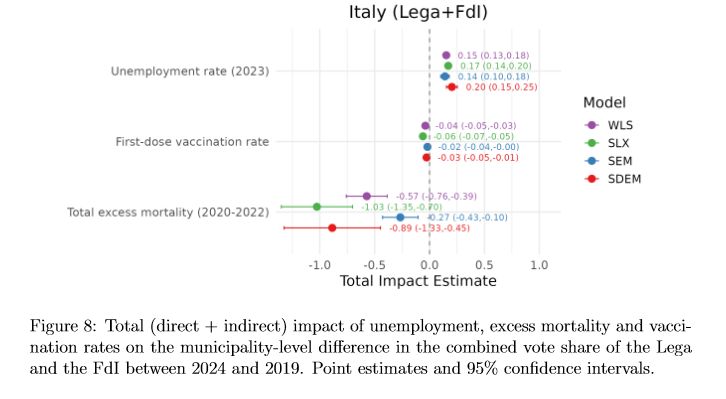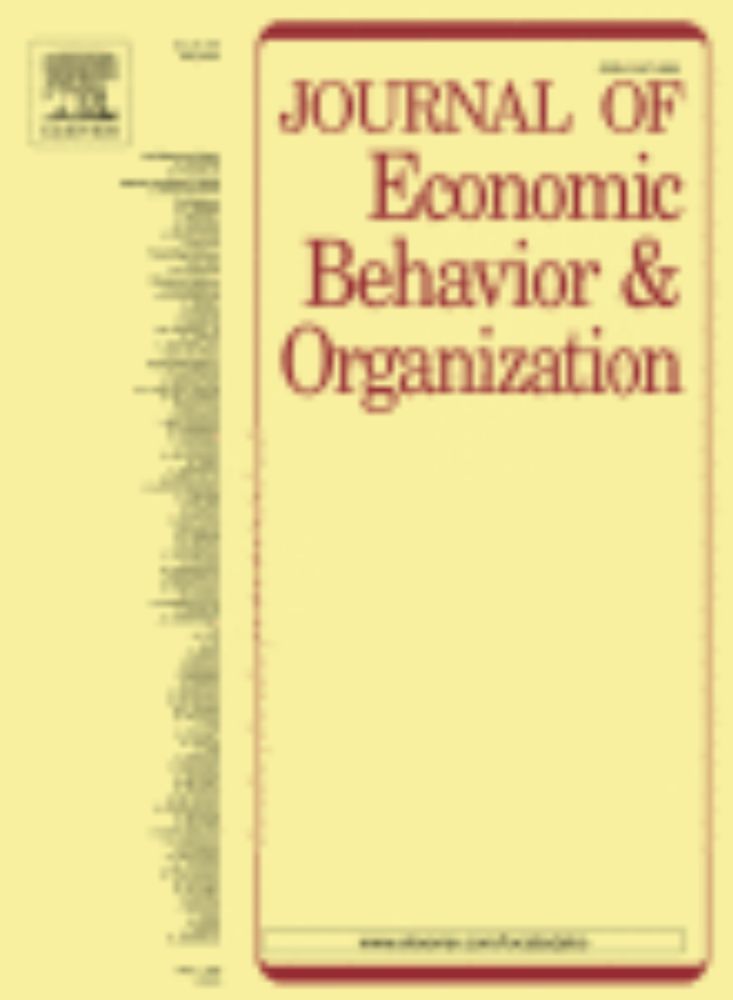Das Absurde ist, dass die meisten trotzdem am 1.1. eine Nettolohnerhöhung bekommen werden (Abschaffung der kalten Progression). Nur: wer mehr Steuern zahlt, erhält (auch prozentuell) mehr. Wer weniger Geld hat, hat im Schnitt eine höhere Konsumquote und ist stärker von der Inflation betroffen!
08.10.2025 06:34 — 👍 0 🔁 0 💬 0 📌 0
"So viel Gutes" steht bei meinen ganz weit oben :)
19.09.2025 12:51 — 👍 1 🔁 0 💬 0 📌 0
Die bekanntesten Methoden sind VPI und BIP-Deflator. Zumindest der VPI auf Basis 2010 ist oberhalb dieser Range, aber nur leicht. I'll see myself out. 2/2
26.08.2025 10:53 — 👍 4 🔁 1 💬 1 📌 0
Naja, es gibt im Prinzip unendlich viele Möglichkeiten, die Inflation zu berechnen, weil sich immer die Frage stellt, wie einzelne Produkte im betrachteten Warenkorb gewichtet werden. 1/2
26.08.2025 10:53 — 👍 4 🔁 1 💬 1 📌 0

ChatGPT - Liste der BundeskanzlerInnen
Shared via ChatGPT
Schaut mir jetzt auf den ersten Blick nicht so schlecht aus, wenn man nicht nach einem Bild verlangt (trotz Tippfehler im Prompt :') ).
ChatGPT ist einfach extrem schlecht darin, Logik in Bildern zu erkennen.
chatgpt.com/share/689c62...
13.08.2025 10:02 — 👍 1 🔁 0 💬 0 📌 0
I am puzzled by this strong initial happiness boost. But this may be due to IVF treatment (i.e., happy because lucky/unhappy because unlucky).
06.08.2025 09:55 — 👍 1 🔁 0 💬 0 📌 0
Final note at the end: We also wanted to study Germany. However, they told us (months after the election) that it would take some more months to release the data. Now, more than one year after the election, they still have not released the data on the municipal-level.... 12/12
22.07.2025 11:57 — 👍 0 🔁 0 💬 0 📌 0
Our results must be treated with caution: this is an observational study and there are likely important factors that are unobservable and that we thus cannot control for. Nevertheless, it is striking to see these differences in outcomes. More results here: unipub.uni-graz.at/obvugrveroef... 11/12
22.07.2025 11:57 — 👍 0 🔁 0 💬 1 📌 0
We only observe one significant impact: the SD won in areas with low post-pandemic unemployment (in contrast to Austria, Italy). 10/12
22.07.2025 11:57 — 👍 0 🔁 0 💬 1 📌 0
This may partly explain the aggregate-level differences between the two countries (strong gains for the FPÖ vs. minor losses for Lega+FdI), even though the particular national context is important (e.g., right-wing coalition in Italy, "Ibiza" scandal in Austria in 2019 etc.) 8/12
22.07.2025 11:57 — 👍 0 🔁 0 💬 1 📌 0
of excess mortality. This means that the Italian right-wing parties performed worse where a lot of people died from Covid-19. Apparently, Italian voters held these parties accountable for their experience with the health risks of Covid-19. Austrians did not. 7/12
22.07.2025 11:57 — 👍 0 🔁 0 💬 1 📌 0
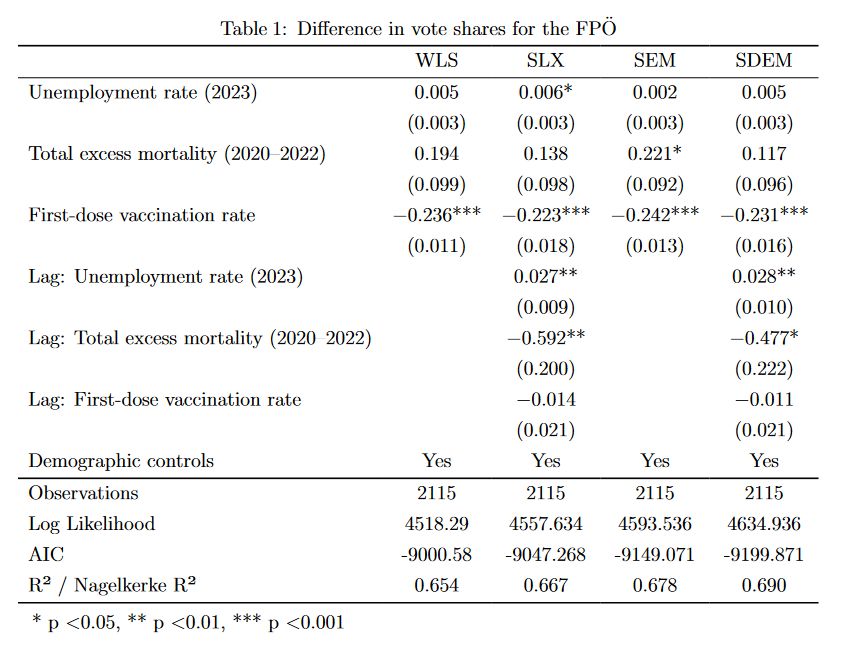
correlated with FPÖ performance), which is the level of skepticism in a given municipality. One specification (SEM) finds a positive (direct) association, but SLX and SDEM a negative indirect impact. This means that the FPÖ fared worse if a lot of people died in a neighboring municipality. 5/12
22.07.2025 11:57 — 👍 0 🔁 0 💬 1 📌 0
Furthermore, we look at excess mortality rates. This is most difficult to interpret, as, on the one hand, higher excess mortality rates may scare off voters from "skeptical" parties. On the other hand, there is likely a positive correlation with an unobservable variable (that is also positively 4/12
22.07.2025 11:57 — 👍 0 🔁 0 💬 1 📌 0
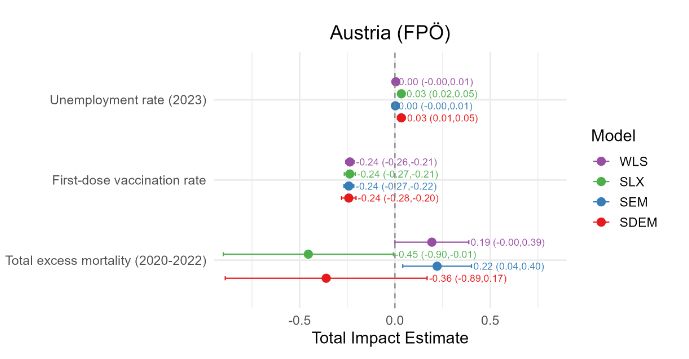
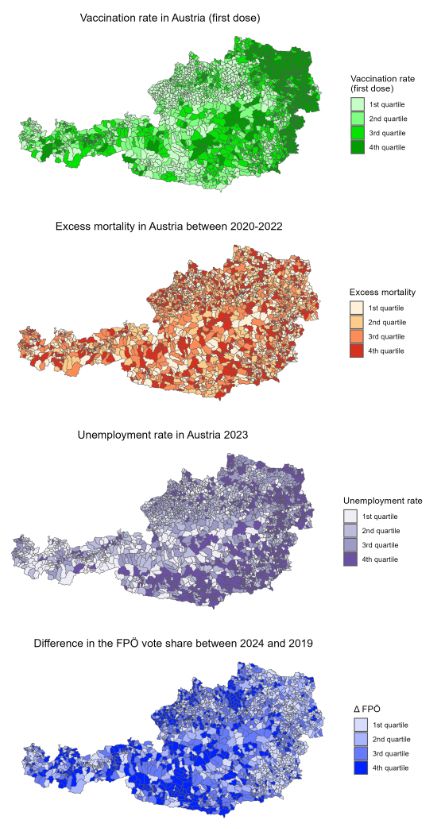
In Austria, the FPÖ staged a strong campaign against Covid-19 measures after performing a U-turn after the first wave of the pandemic (see my JEBO paper (www.sciencedirect.com/science/arti...). The party gained particularly in areas with high post-pandemic unemployment and low vaccination rates 3/12
22.07.2025 11:57 — 👍 0 🔁 0 💬 1 📌 0
We use OLS and three different types of spatial regressions (SLX, SEM and SDEM) and control for age, education, degree of urbanization and GRP in the municipalities. Our analysis suggests that the pandemic had a significant impact on voting behavior even years after the last lockdown 2/12
22.07.2025 11:57 — 👍 0 🔁 0 💬 1 📌 0
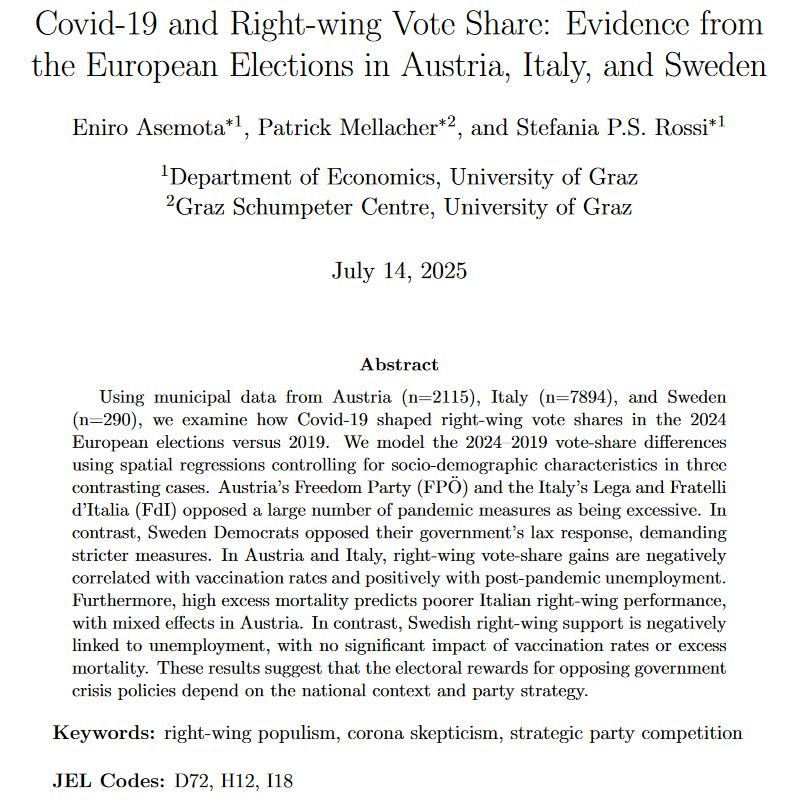
Abstract of the paper "Covid-19 and Right-wing Vote Share: Evidence from the European Elections in Austria, Italy, and Sweden"
Happy to announce the publication of our new preprint: E. Asemota, S. Rossi and I explore how the Covid-19 pandemic has affected support for right-wing populist parties on a local level in the European Parliament elections of 2024 in three contrasting cases: Austria, Italy and Sweden 1/12
22.07.2025 11:57 — 👍 0 🔁 0 💬 1 📌 0
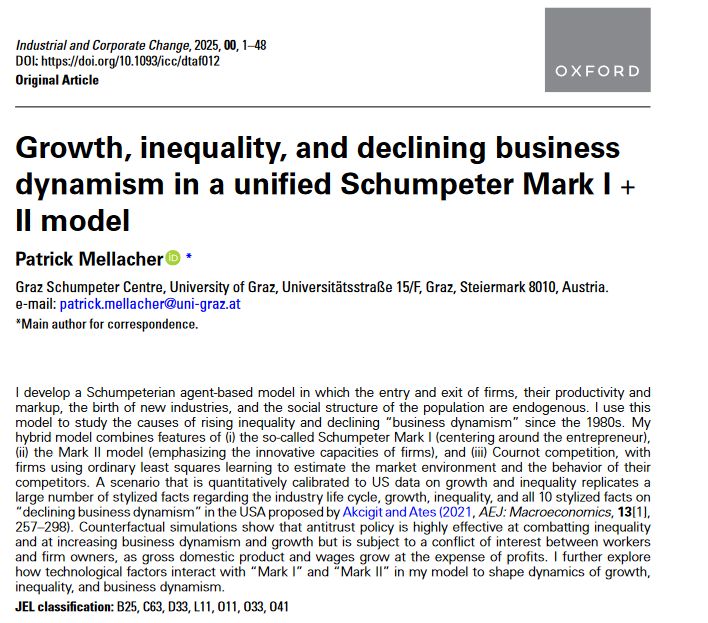
Abstract of the paper "Growth, inequality and declining business dynamism in a unified Schumpeter Mark I + II model" published in the journal Industrial and Corporate Change (annual issue on Macro and Development): https://academic.oup.com/icc/advance-article/doi/10.1093/icc/dtaf012/8131422
I'm thrilled to announce the #OA publication of my paper "Growth, inequality and declining business dynamism in a unified Schumpeter Mark I + II model" in Industrial and Corporate Change (annual issue on Macro and Development): academic.oup.com/icc/advance-...
15.05.2025 07:35 — 👍 4 🔁 0 💬 0 📌 0
Obwohl dieses Ziel anfangs propagiert wurde, ging es später durch den Erfolg der Maßnahmen während der ersten Welle aus meiner Sicht eher darum, so lange durchzuhalten, bis alle die Möglichkeit hatten, sich zu impfen.
05.03.2025 12:04 — 👍 1 🔁 0 💬 1 📌 0
!
Mehr vom Autor auch hier www.youtube.com/watch?v=biZR...
27.02.2025 17:59 — 👍 7 🔁 3 💬 0 📌 0
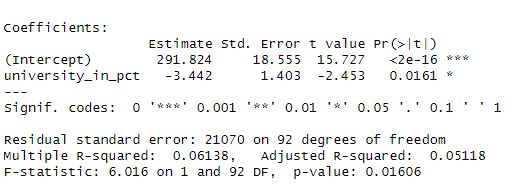
gewichtete Regression, Anteil der UniversitätsabsolventInnen reduziert die Zahl der Covid-19 Toten pro EW leicht.
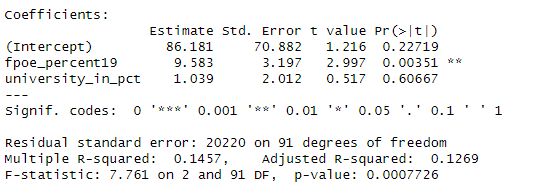
gewichtete Regression mit FPÖ-Anteil, Anteil der UniversitätsabsolventInnen hat keinen signifikanten Effekt auf die Covid-19 Toten pro EW.
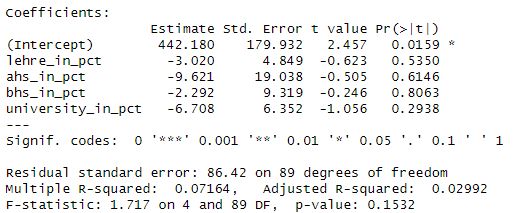
Regression mit Anteil an Lehre, AHS, BHS und Uni-AbsolventInnen. Zusammen erklären diese Variablen weniger Varianz als der FPÖ-Anteil 2019
Es ist aber auch so, dass das Bildungsniveau die Differenzen in den Sterberaten weniger gut vorhersagen können, als Unterschiede im FPÖ-Anteil 2019. Hierzu ein paar Modelle mit und ohne FPÖ (bitte ALT-Text für eine Beschreibung lesen) 2/2
27.02.2025 09:14 — 👍 2 🔁 0 💬 1 📌 0
Warum der Fokus auf die FPÖ und nicht auf Bildung? Das formale Bildungsniveau der Bevölkerung hat sich zwischen März/April 2020 und Herbst/Winter 2020/21 nicht maßgeblich verändert. Daher ist dieser Faktor nicht dafür geeignet, Differenzen in den Sterberaten zwischen den Wellen zu erklären. 1/2
27.02.2025 09:14 — 👍 2 🔁 0 💬 1 📌 0
Danke, v.a. auch für eure #ACPP Daten, die sehr wichtig waren, um den Themenkomplex wirklich umfassend beleuchten zu können. Congrats auch zum wie immer souveränen Auftritt.
26.02.2025 14:48 — 👍 3 🔁 0 💬 0 📌 0
Bei Impfungen kann das sein (wobei das mehrere Gründe haben kann), aber bei den Todesfällen finde ich keinen statistisch signifikanten Zusammenhang zwischen ÖVP Wahlergebnis 2019 und Todesfällen pro EW.
26.02.2025 13:09 — 👍 2 🔁 0 💬 0 📌 0
(nach einem sehr gründlichen Peer-Review Verfahren mit 3 anonymen GutachterInnen + Kommentaren der Herausgeberin). Es ist schön, dass ein Teil der Ergebnisse jetzt im Hauptabendprogramm des ORF präsentiert wurden, auch wenn es nicht ganz stimmt, dass die Studie "soeben" publiziert wurde 😅 16/16
26.02.2025 09:43 — 👍 23 🔁 0 💬 2 📌 0
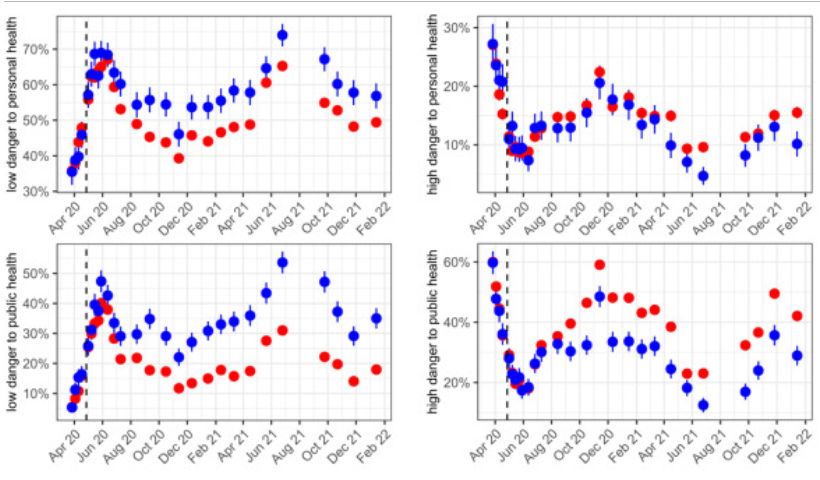
dass Personen, die die FPÖ 2019 gewählt haben, nach dem Schwenk der FPÖ im Durchschnitt andere Ansichten bzgl. der gesundheitlichen Risiken von Covid-19 teilten, als die restliche Bevölkerung - sie hielten die gesundheitliche Gefahr sowohl für sich, als auch für die Gesellschaft für niedriger. 14/16
26.02.2025 09:43 — 👍 14 🔁 1 💬 1 📌 0
Dennoch zeigen Forschungsergebnisse, dass Parteipolitik die Ansichten der WählerInnen der jeweiligen Partei beeinflusst - und diesen Effekt sehen wir auch in diesem Fall. Dafür habe ich mir Daten aus dem #ACPP angesehen und u.a. herausgefunden, 13/16
26.02.2025 09:43 — 👍 14 🔁 1 💬 1 📌 0
Mathematics Sorceror (sensory alchemist) at the Arctangent Transpetroglyphics Algra Laboratory (ATAL), I transflarnx mathematics into living rainbows. http://owen.maresh.info https://github.com/graveolensa
Psoeppe-Tlaxtlal, (an undreamt splendour?)
Feminist Economics, journal of IAFFE. Provides an international forum for economic debate, supporting research oriented towards improving human well-being.
Researcher in Open Science, Public Trust in Science, Social & Environmental Psychology and other cool stuff. Posts are my own. Pic is from Webb (https://science.nasa.gov/mission/webb/multimedia/images/)
ECPR is an independent, scholarly association with a mission to advance political science ▪ https://ecpr.eu/ ▪ https://podcasters.spotify.com/pod/show/ecpr/ ▪ @ecprtheloop.bsky.social
IIT Kanpur | La Trobe University
Water pollution, sustainability, climate change, computational social science & memes
Official account for NetLogo https://www.netlogo.org/
Professor, UW Biology / Santa Fe Institute
I study how information flows in biology, science, and society.
Book: *Calling Bullshit*, http://tinyurl.com/fdcuvd7b
LLM course: https://thebullshitmachines.com
Corvids: https://tinyurl.com/mr2n5ymk
he/him
Schriftsteller, KI-Risiken-Aufklärer. YouTube.com/karlolsbergautor. www.ki-risiken.de.
Postdoctoral Researcher at University of Vienna.
Dr in Political Science from Humboldt University of Berlin
Political science, political communication, electoral campaigns, targeting, party competition, public opinion polls
https://christina.gahn.at
🇦🇹 Bundesminister für Finanzen
Impressum: https://www.bmf.gv.at/public/impressum.html
More about me here:
https://homepage.univie.ac.at/erich.neuwirth/
Gender Scholar
Researching (a)sexualities, health communication, masculinities, contraception/safer sex, repro health, climate crisis, IR, peace/conflict studies, utopias/dystopias, mental health, media, history,...
https://orcid.org/0009-0009-7802-2721
Blogger & Writer.
Topics: Science, Economy, Tech, Climate Change, Democracy
Job: Communication @UniGraz
roman.vilgut@uni-graz.at
Mastodon: @RomanVilgut@graz.social
Business: http://linkedin.com/in/roman-vilgut
Hell: https://twitter.com/RomanVilgut
ehemalige Ärztin in Ausbildung zur Anästhesistin - jetzt selbst und ständig als FÄ für Allgemeinmedizin, Notärztin, ehemalige DGKP, hier ist alles und immer absolut meins. danke
🏳️🌈❤️
Political scientist @ University of Vienna 🇬🇧🇩🇪🇦🇹🏳️🌈
Editors: Klaus H. Goetz, Dorte Sindbjerg Martinsen, Wolfgang C. Müller. Posts by social media editor @martingross.bsky.social
WEP on LinkedIn: https://www.linkedin.com/company/west-european-politics/
Research and insights from the Department of Economics at City St George’s, a distinguished member of the University of London.
https://www.citystgeorges.ac.uk/about/schools/policy-global-affairs/economics#accordion576967-header576972
The European Political Science Society: the not-for-profit professional association for political science in Europe and beyond
https://epssnet.org/
Political scientist | University of Siegen | political attitudes & behavior | migration & integration | quantitative methods

